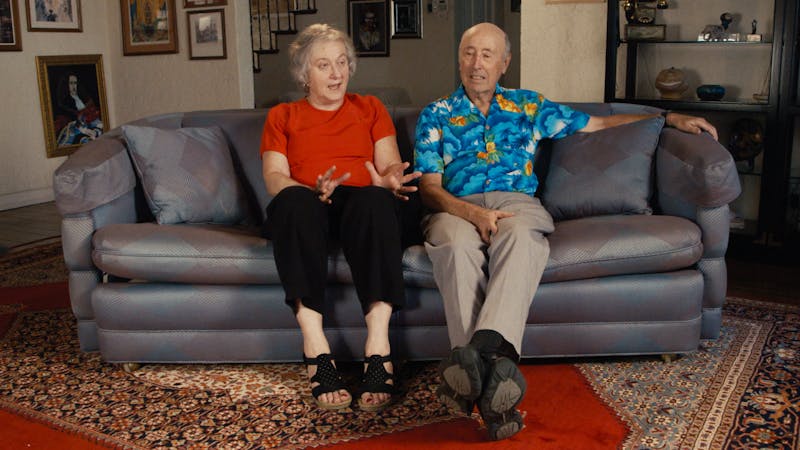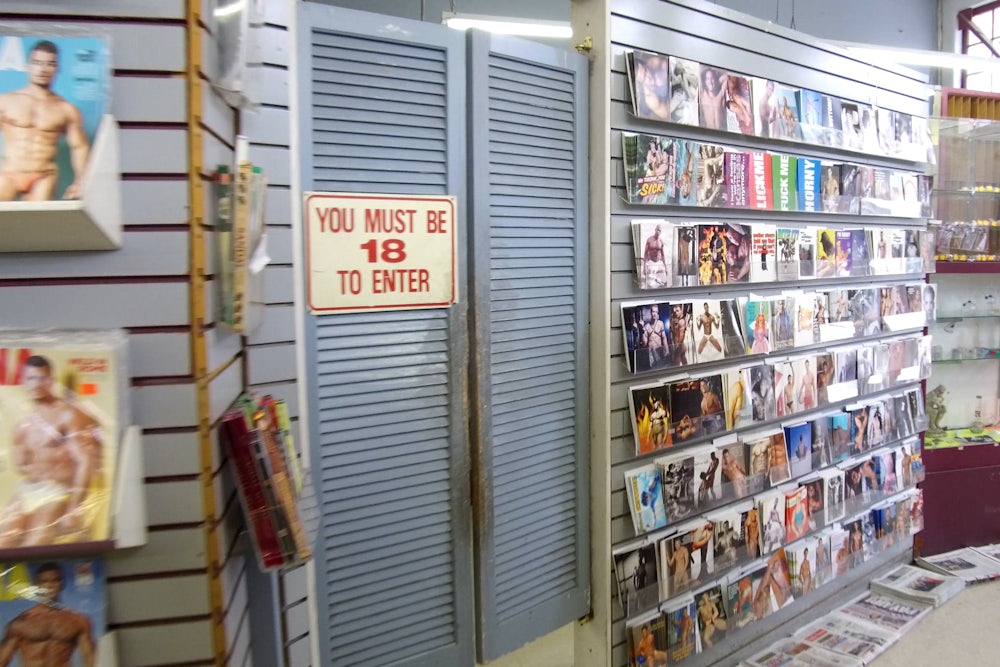Some time in the mid-1980s, a kid named Micah Mason swiped a dirty VHS tape from the back seat of his parents’ car. He waited months to watch it in secret, only to find, at the fatal moment, that he’d stolen a Betamax—the wrong format. One’s sex-starved adolescent years are made of such moments, when the longed-for apotheosis doesn’t happen. Or at least they used to be, before the internet met all our needs so satisfactorily.
Circus of Books is a new Netflix documentary celebrating things that the internet and time have destroyed. That Beta tape ended up in his mom’s car in the ’80s because Micah’s family in fact owned a small franchise of bookstores-cum-hard-core-gay-sex-shops across Los Angeles. If their kid had been a customer, his parents could have gotten him anything he wanted: They stocked all kinds of porn at the store, as well as magazines on topics from woodwork to literature. “The New York Review of Books never sold very well,” Karen Mason recalls. “What sold well was Hustler.”
Micah, his brother, Joshua, and his sister, Rachel, knew nothing about their parents’ enterprise. To them, and to their social milieu, Karen and Barry Mason were a conventional, middle-class Jewish couple. Rachel, the rebellious child who thought her parents were squares, grew up to be a filmmaker, and Circus of Books is her documentary. At once intimate and ambitious, the film is as much an unraveling of family secrets as it is an excavation into forgotten seams of American queer history.
Rachel interviews both Larry Flynt and the legendary retired porn star Jeff Stryker, who both affectionately reflect on doing business with her parents in the ’80s. The Masons got into the adult magazine game in the late 1970s, after responding to one of Flynt’s newspaper ads looking for distributors. In 1982 they expanded into bricks and mortar, when they took over a preexisting store named Books Circus. Barry chopped the sign in half, switched it around, and only paid for the “of.”
In these entrepreneurial hands, one store became three, and the Masons spent the 1980s becoming one of the nation’s most important distributors of adult miscellanea for gay men. The original shop had a “Vaseline Alley” out back, where one interviewee in the documentary recalls losing his virginity to a cop in training: “Every young boy’s wet dream!” The Masons stocked some of the very first gay porn magazines to peep above ground in America, gracefully typeset publications like One and Male Figure.
Under Rachel’s gentle questioning, the story of the bookstore flowers into a reminiscence of gay Los Angeles. Long before the Masons bought the store, it turns out, Books Circus had been a site for queer men in L.A. to congregate; the original owners had connections to the 1966 protests at the Black Cat against anti-gay police brutality. As the venerable LGBT rights activist Alexei Romanoff puts it in the documentary, “Those bookstores were really important, because they had literature about our lives. I mean, we were the unspoken, hidden people that you never talked about because they were disgusting.” A publisher named Billy Miller says, “I can’t even explain how different it was. To be a homo was unspeakable, basically.”
The luck of Circus of Books rose and fell with that of pornography itself. Because they trafficked in images of the “unspeakable,” the Masons ended up becoming targets for Ronald Reagan’s obscenity witch hunts. “Isn’t it time we remove the profit motive from activities which are sick and unsafe?” Reagan had asked America on television. The Meese Report, the attorney general’s 1986 investigation into pornography, eventually led to a full-blown FBI raid on their store. An agent posing as a customer had drawn them into transporting “obscene material” across state lines. The agents looked just like they do on TV, Karen remembers, with the jackets reading “FBI” on the back and everything. The charges against Barry were dropped when Bill Clinton was elected to office.
The fact that the leader of the free world was intent on locking up the Masons makes it all the more insane that their kids had no idea what was going on. Even once they learned of the store’s existence, as teenagers, they didn’t understand what it all meant. Rachel Mason has tucked one movie inside another: For all the big historical themes in Circus of Books, the story of how Karen Mason kept her gay porn business a secret for almost 40 years is compelling above all else.

Karen Mason insists that she had no interest in gay porn whatsoever and that she and her husband simply needed to make a buck. Yes, she produced the movies Meat Me at the Fair and Hard Ball, but she didn’t watch them. Whether or not that is true, Karen certainly became an intensely religious woman at the same time as she became an adult industry entrepreneur. She believed that homosexuality was an abomination while selling dildos, a heroic act of psychological compartmentalization that is magnetic to watch.
Although Circus of Books has three clear subjects—politics, the family, the bookstore—they each flow into one another, belying the idea that they are separable phenomena. Yes, the Republicans made a big noise about pornography once upon a time. Yes, it was once very, very difficult to be gay in the United States of America. But as we watch Karen shut up shop for the final time, her store made extinct by Grindr and the internet, it’s with the sense of watching history in its most granular form, which is in itself joyful. Circus of Books is the story of an American family who wandered into the eye of history, and a virtuoso example of how to make a movie both very big and very small at once.
